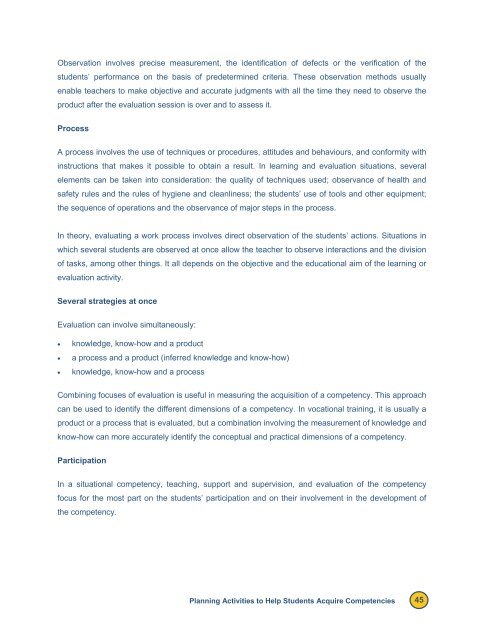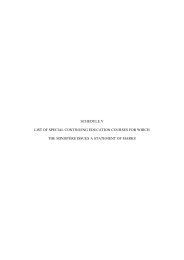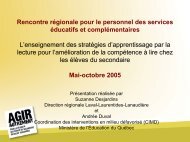Reference Framework for Planning Learning and Evaluation Activities
Reference Framework for Planning Learning and Evaluation Activities
Reference Framework for Planning Learning and Evaluation Activities
Create successful ePaper yourself
Turn your PDF publications into a flip-book with our unique Google optimized e-Paper software.
Observation involves precise measurement, the identification of defects or the verification of the<br />
students’ per<strong>for</strong>mance on the basis of predetermined criteria. These observation methods usually<br />
enable teachers to make objective <strong>and</strong> accurate judgments with all the time they need to observe the<br />
product after the evaluation session is over <strong>and</strong> to assess it.<br />
Process<br />
A process involves the use of techniques or procedures, attitudes <strong>and</strong> behaviours, <strong>and</strong> con<strong>for</strong>mity with<br />
instructions that makes it possible to obtain a result. In learning <strong>and</strong> evaluation situations, several<br />
elements can be taken into consideration: the quality of techniques used; observance of health <strong>and</strong><br />
safety rules <strong>and</strong> the rules of hygiene <strong>and</strong> cleanliness; the students’ use of tools <strong>and</strong> other equipment;<br />
the sequence of operations <strong>and</strong> the observance of major steps in the process.<br />
In theory, evaluating a work process involves direct observation of the students’ actions. Situations in<br />
which several students are observed at once allow the teacher to observe interactions <strong>and</strong> the division<br />
of tasks, among other things. It all depends on the objective <strong>and</strong> the educational aim of the learning or<br />
evaluation activity.<br />
Several strategies at once<br />
<strong>Evaluation</strong> can involve simultaneously:<br />
• knowledge, know-how <strong>and</strong> a product<br />
• a process <strong>and</strong> a product (inferred knowledge <strong>and</strong> know-how)<br />
• knowledge, know-how <strong>and</strong> a process<br />
Combining focuses of evaluation is useful in measuring the acquisition of a competency. This approach<br />
can be used to identify the different dimensions of a competency. In vocational training, it is usually a<br />
product or a process that is evaluated, but a combination involving the measurement of knowledge <strong>and</strong><br />
know-how can more accurately identify the conceptual <strong>and</strong> practical dimensions of a competency.<br />
Participation<br />
In a situational competency, teaching, support <strong>and</strong> supervision, <strong>and</strong> evaluation of the competency<br />
focus <strong>for</strong> the most part on the students’ participation <strong>and</strong> on their involvement in the development of<br />
the competency.<br />
<strong>Planning</strong> <strong>Activities</strong> to Help Students Acquire Competencies 45




